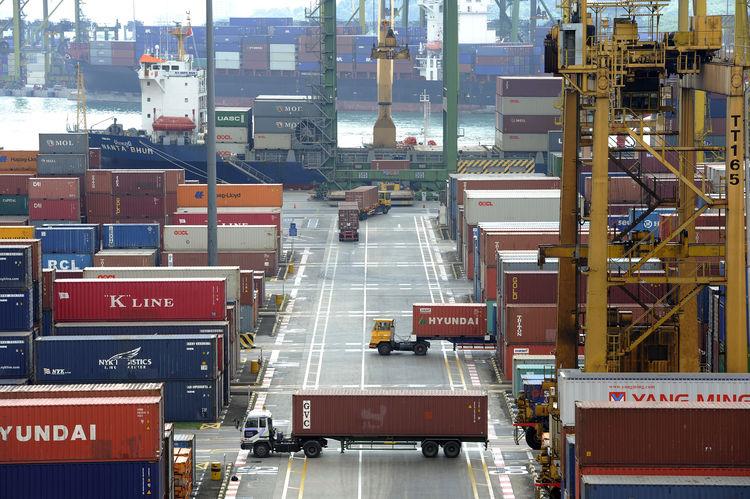- FG’s Incentives Rekindle Hope for Export Sector
The Federal Government is targeting the export sector with its recent policy initiative. ANNA OKON gives details of the incentives and the countries that influenced the policy.
About 13 export incentive schemes are in place in Nigeria including the Export Expansion Grant that entails the provision of non-cash grant to exporters as an incentive to enable them to expand their export volume and value.
Pioneer Status: The Pioneer Status tax holidays apply to any manufacturing exporter who exports at least 50 per cent of their annual turnover.
Duty Drawback Scheme: Under this scheme, participating companies are granted the privilege to import all raw material inputs whether prohibited or not, equipment, machinery and spare parts free of import duties.
Free Trade Zones: The Nigerian Export Processing Zones Authority was set up by Acts No 63 of 1992 to promote rapid establishment and development of export-oriented industries through the creation of export free zones.
Tax Relief on Interest Income: This scheme grants tax exemption on interest accruing to banks for loans extended to export activities.
Buyback Arrangement: This allows for importation of plants/ machinery and inputs to be used for export production and paid with the production output. The objective was to ease the problems associated with sourcing foreign exchange needed for importation and improve export production.
Manufacturer Exporters In-Bond Scheme: This was designed to provide for refund of duties / surcharges on raw materials including packing and packaging materials used for the manufacture of products upon effective exportation of the final product.
Export Adjustment Scheme Fund/Export Development Fund: This was set up by the Export Incentives and Miscellaneous Provision Act of 1986 to provide assistance to private sector exporting companies to cover part of their export promotion activities.
Others are the Currency Retention Scheme, ECOWAS Trade Liberalisation Scheme, Capital Asset Depreciation Allowance, and the Profit Exemption from Tax.
Out of these, only five; EEG, Pioneer Status, Currency Retention, FTZ, ECOWAS Trade Liberalisation, are functional, with the EEG being the most operational.
In 2014, the government suspended EEG following allegations of widespread abuse. The suspension, according to an export trade analyst, Mr. Kola Awe, had caused the non-oil export sector to decline by over 50 per cent.
Following the crash in global oil prices and the dwindling revenue from oil, the Nigerian government moved to aggressively diversify the economy from oil and revamp the non-oil sector.
In line with this vision and after consultation with stakeholders, the Federal Government in 2016 lifted the ban on the EEG and made provision for backlog payments in the 2017 budget.
In February 2018, stakeholders were informed that the government had decided to revive all the moribund export incentives and also introduce a new one.
Among the ‘dead’ incentives that the government brought back are the Export Development Fund, the Export Adjustment Scheme Fund and the Manufacture-In-Bond Scheme.
The government also introduced a new incentive called Export Support/Litigation Fund.
Stakeholders hailed the initiative as a good one and one that would double the growth of the non-oil export sector. In addition to the revived incentives, exporters were also assured that they would be paid before shipment.
The Publicity Secretary, National Cashew Association of Nigeria, Mr. Sotonye Anga, welcomed the initiative, noting that the export sector needed a robust incentive regime to grow.
“Exporters cannot survive on bank credit because the interest rate is too high. What the sector needs is government’s incentives,” he said.
The government had disclosed that the decision was influenced by the robust export incentive culture of other successful export trading countries.
While presenting the new basket of incentives to stakeholders, the Acting Director/Chief Executive Officer, Nigerian Export Promotion Council, Mr. Abdullahi Sidi-Aliyu, disclosed that the government was guided in its action by the implementation procedures of functional incentives obtainable in other countries.
The countries with effective incentive schemes that influenced the basket include African countries such as Kenya, Ghana and Asian countries such as India. A look at their incentive schemes shows that they are similar to the Nigerian model.
In Kenya, incentive schemes available to exporters include Duty Remission Facility: The scheme ranges from refunds on exported goods to duty remission on raw material at the time of importation.
Manufacture Under Bond: Enterprises operating under the programme are offered exemption from duty and VAT on imported raw materials as well as 100 per cent investment allowance on plant, machineries, equipment and building.
Export Processing Zones Programme: This programme encourages the establishment and development of private EPZs to boast the country’s exports. All the private EPZs operating under this scheme enjoy 10 years tax holiday as well as exemption from all withholding taxes on dividends for the same period. Thereafter, they are placed on a flat rate of 25 per cent tax for another 10 years. Companies in the EPZ programme are also exempted from import duties on raw materials and other intermediate inputs.
In Ghana, they have Export Proceeds Retention Scheme which allows exporters to exchange 100 per cent foreign exchange proceeds from non-traditional exports into Cedis at competitive rates negotiated with the exporter’s bankers or keep them in their foreign exchange accounts.
Corporate Tax Rebate: This scheme allows any manufacturer or any person engaged in agricultural production or exporting part or all of their production to claim tax rebate between 40 per cent and 75 per cent of their tax liability.
Custom Duty Drawback: this allows exporters to draw back up to 100 per cent of duties paid on materials imported to produce goods for export.
Bonded Warehousing Scheme: This scheme allows manufacturers to seek Customs licence to hold imported raw materials intended for manufacturing of goods for export in secure places without payment of duty.
Up-Front Duty Exemption: The Up – Front Duty Exemption operates alongside the duty drawback system. It enables exporters to enjoy 100 per cent duty exemption on imported inputs intended to go into production of goods for export.
In India, there is the Merchandise Export from India Scheme. The Merchandise Export from India Scheme was introduced to offset infrastructural inefficiencies and associated costs involved, provide a level playing field to exporters and increase export of goods.
The second one is the Service Export from India Scheme which provides rewards to all service providers of notified services who are providing exporting services from India.
Stakeholders in the non-oil export sector have hailed the Nigerian incentive programme saying that with proper implementation it would propel the export sector to impressive growth.
The Chairman, the Lagos Chamber of Commerce and Industry Export Group, Mr. Obiora Madu, said that the initiative was a good one, adding that with implementation and removal of other hindrances to the export trade in the country, exporters who had gone underground would be encouraged to declare their exports openly and the non-oil export sector would witness a tremendous growth.
He said that the government had looked at what happened in India, Maylasia and India before coming up with the new basket of incentives.
The President, Federation of Agricultural Commodities Association of Nigeria, Dr. Victor Iyama, told our correspondent that the new scheme would push the growth of the non-oil export sector above 300 per cent.
He said, “I believe the growth of the sector will be tripled if there is consistency in the policy.
“This policy is better than the EEG in terms of encouraging up and coming exporters who had no opportunity to access bank loans.”
For the Chairman, Manufacturers Association of Nigeria Export Promotion Group, Chief Ede Dafinone, the introduction of the new basket would bring about a remarkable growth in the non-oil export volume by the end of the first quarter of 2019.
“The scheme will encourage new operators to come into the export sector and that way, more jobs would be generated,” he said.
An export logistics expert, Mr. Kolawole Awe, said that with the widening of the basket, more people would be attracted to the non-oil export sector.
Awe said, “The EDF, for instance, is targeted at SMEs that are hampered by funding capacity to expand their market. With the EDF, they have access to funds to be able to take care of their labelling, branding, advertisement issues and more importantly to be able to access the international market.
“So you can imagine the myriad of opportunities opened to new and existing exporters.”
He expressed confidence that the scheme would greatly impact on the figures of the non-oil export sector while SMEs would be able to produce, sell more and employ more people.


 Forex3 weeks ago
Forex3 weeks ago
 Naira3 weeks ago
Naira3 weeks ago
 Billionaire Watch3 weeks ago
Billionaire Watch3 weeks ago



 Naira3 weeks ago
Naira3 weeks ago






 Naira2 weeks ago
Naira2 weeks ago




 Naira2 weeks ago
Naira2 weeks ago




 Naira4 weeks ago
Naira4 weeks ago






 Naira2 weeks ago
Naira2 weeks ago























